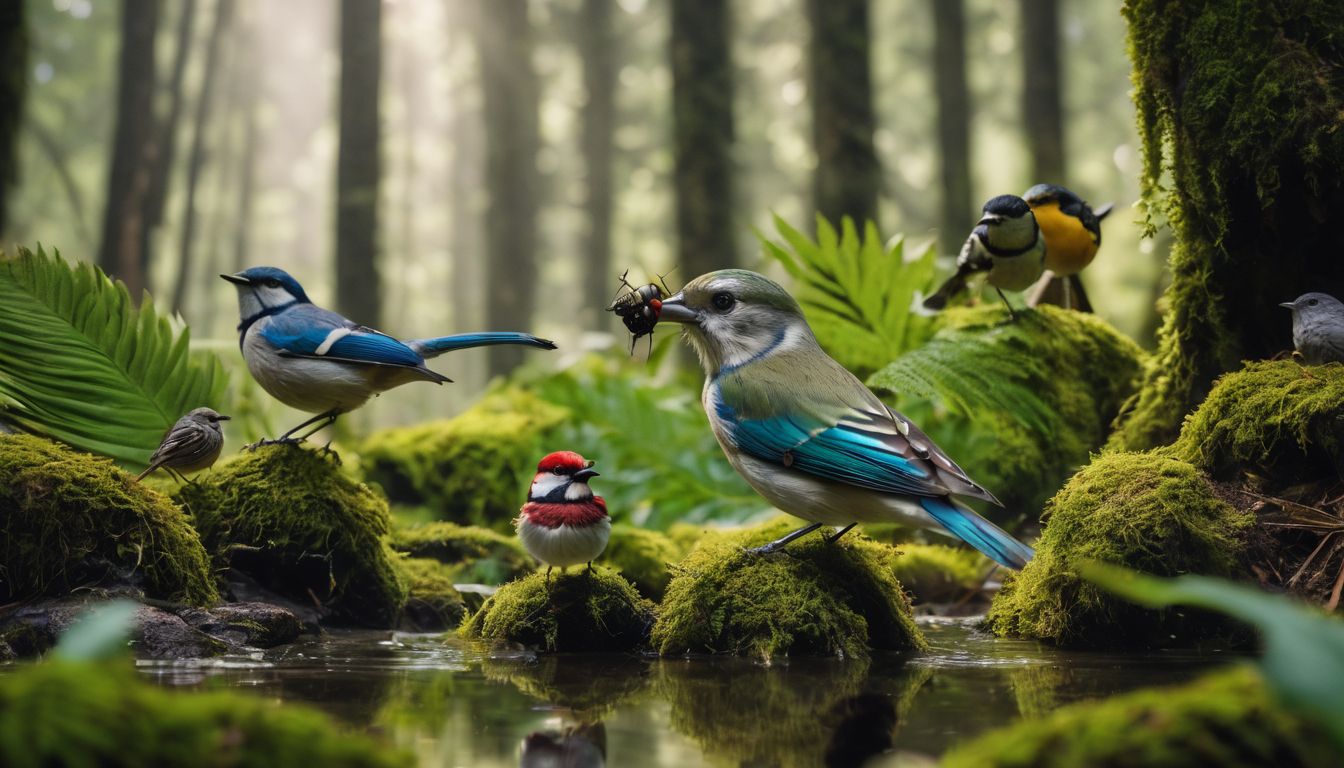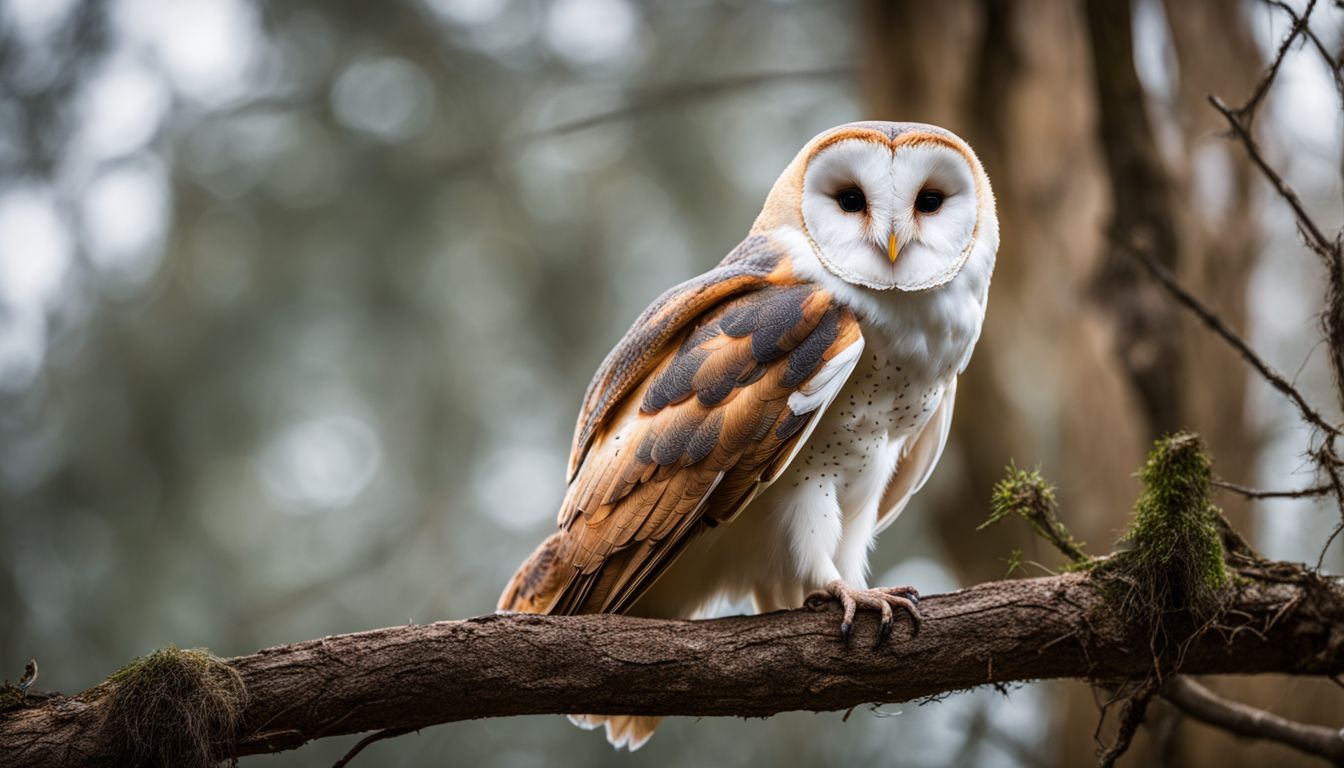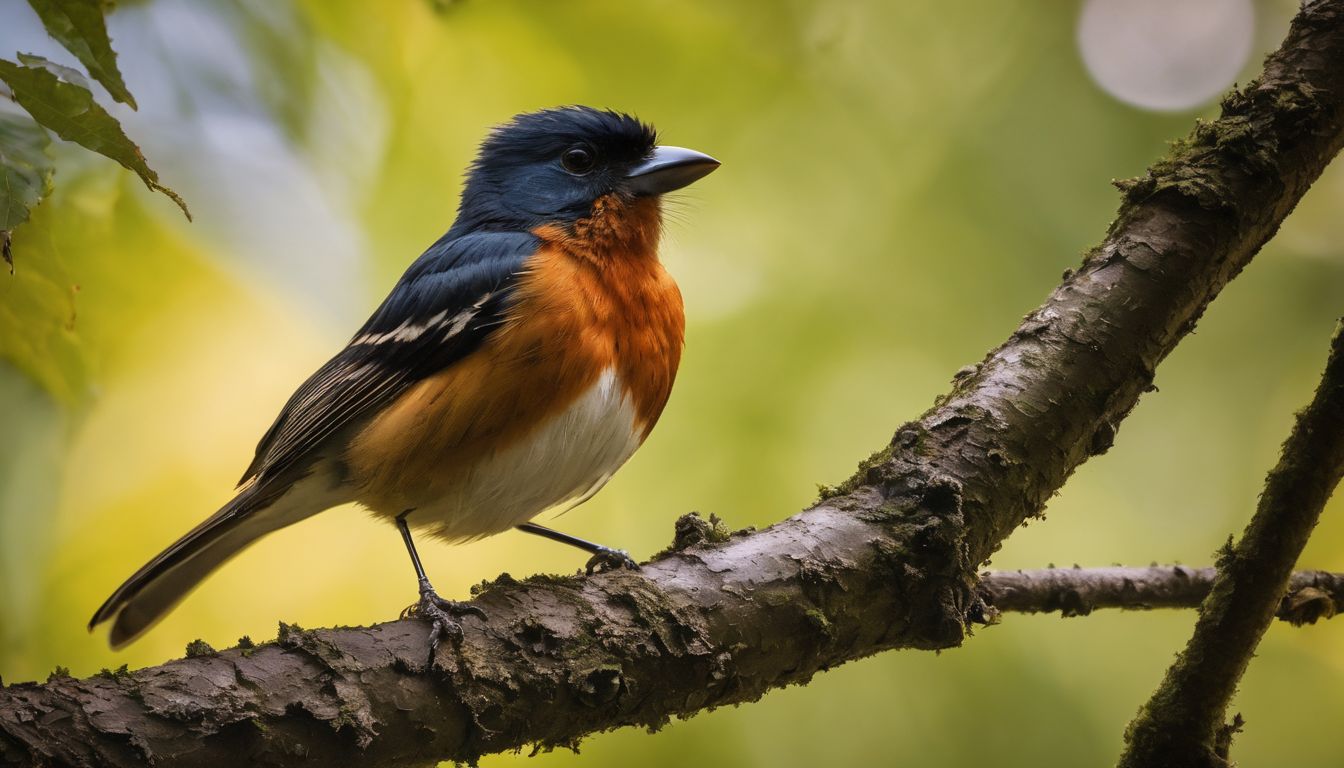Have you ever spotted a bird pecking at something small and wondered if it’s munching on a spider? Surprisingly, many birds include these eight-legged creatures in their meals. This blog post will dive into the diverse world of avian diets to reveal why and how birds prey on spiders.
Keep reading to discover the intricate dance between winged hunters and their arachnid prey!
Key Takeaways
- Many bird species, including insectivorous ones, consume spiders as a crucial source of protein and nutrients for their survival and growth.
- Birds play a significant role in controlling spider populations, contributing to natural pest control in gardens and yards.
- Creating bird – friendly habitats by planting native species, providing food sources like birdbaths and nesting boxes, and avoiding pesticide use can help support the delicate balance between birds and spiders while promoting ecological sustainability.
Understanding the Dietary Habits of Birds

Birds have a varied diet, with some species being purely insectivorous and others being omnivores. Spiders play a significant role in the diets of many bird species, providing essential protein and nutrients for their survival.
The role of spiders in a bird’s diet
Spiders play a big part in what birds eat. Many birds look for them while hunting for food. They do this because spiders are full of protein. This helps young birds grow strong and healthy.
Some birds, like wrens and bluebirds, eat lots of spiders.
Eating spiders also keeps their numbers just right in nature. When there are too many spiders, birds help by eating more of them. This is good for gardens and farms where too many spiders could be a problem.
Plus, when they eat these eight-legged creatures, they get taurine—an important thing that helps with their development.
Variations in spider consumption among bird species
Different birds eat spiders in different amounts. Some birds, like the ones that love insects, will eat spiders a lot. These birds search for bugs and also catch spiders to feed their young or fill their bellies.
Other birds might not look for spiders first but will grab them if they find them while looking for other food.
For example, hummingbirds usually want nectar but they’ll snatch up tiny spiders too sometimes. Bigger birds such as barn swallows fly around catching insects in the air and often end up eating a spider or two along the way.
Birds like blue jays are more all-around eaters; they enjoy nuts and seeds but won’t say no to a juicy spider when they see one.
Birds known for eating lots of pests keep gardens safe from too many insects and spiders without needing chemicals.
Birds Known for Eating Spiders

From owls and their nocturnal hunts to the insectivorous diets of wrens and bluebirds, there are a variety of bird species known for consuming spiders as part of their diet. Even sparrows exhibit opportunistic feeding habits, making them one of the many birds that play a role in controlling spider populations.
Owls and their nocturnal hunts
Owls come out at night to hunt. They use their amazing hearing to find food in the dark. With sharp claws and a curved bill, they catch and eat animals like spiders, bugs, and worms.
Owls make homes in forests around the world. They lay their eggs in nests up in trees.
These night hunters are quiet flyers with special feathers for sneaking up on prey. Their eyesight is very good at night too. This helps them see spiders and other small creatures to munch on.
Owls help keep spider numbers down, making sure there aren’t too many crawling around.
The insectivorous diets of Wrens and Bluebirds
Insectivorous birds like wrens and bluebirds play a crucial role in controlling spider populations. Their diets heavily rely on spiders, consuming an estimated 400–500 million of them annually.
This makes them essential for managing insect and arachnid populations in their habitats, contributing to the balance of local ecosystems. Studies have shown that these bird species rapidly adapt their foraging behavior in response to changes in spider availability, showcasing their remarkable ability to adjust their diets based on prey abundance.
Spiders form a significant part of the diet of insect-eating birds such as wrens and bluebirds, with these avian species consuming hundreds of millions of spiders each year. This underscores the important role these birds play in maintaining ecological balance by regulating insect and spider populations within their habitats.
Sparrows and their opportunistic feeding habits
Sparrows are not picky eaters. They’ll consume a variety of insects, and that includes spiders. They get most of their animal protein from creatures like insects and spiders, showing how open they are to different kinds of food sources.
Understanding the feeding habits of sparrows gives us insight into their role in controlling insect populations and maintaining balance in the ecosystem. This knowledge also helps us create environments that attract these beneficial birds.
Now let’s explore birds known for eating spiders.
Robins, Thrushes, and other garden visitors
Robins, thrushes, and other birds that visit gardens are important for controlling insect populations. These birds have a varied diet that includes spiders along with insects, worms, small reptiles, amphibians, fruit, and berries.
The American Robin is one such species known for regularly consuming spiders as part of its insectivorous diet.
– Robins and thrushes help maintain the ecological balance in gardens by keeping pest populations under control.
The Benefits of Birds Eating Spiders
Birds eating spiders provide natural pest control in gardens and yards, contributing to the ecological balance between birds and spiders. Interested in learning more about the role of arachnids in avian diets? Keep reading!
Natural pest control in gardens and yards
Birds and other wildlife are effective in keeping the spider population in check. Having bird feeders can attract birds that eat spiders and other common pests, helping control their numbers.
Insects and arthropods in the yard and garden also play a vital role in controlling pest species without harming plants. Additionally, establishing a backyard wildlife habitat can attract natural pest control agents to maintain a healthier environment for both plants and animals.
Certain species of centipedes are natural predators of spiders, aiding in keeping their populations under control. Reptiles, amphibians, and small mammals can also contribute to managing pests effectively in gardens and yards by preying on them as part of the ecological balance.
The ecological balance between birds and spiders
Birds play a vital role in maintaining the ecological balance by consuming spiders and controlling their population. This helps in managing the abundance of spiders that are pests to humans and reduces their impact on the environment.
Spiders, in turn, benefit humans by preying on insects that are considered pests, indirectly aiding in pest control for crops and gardens. The relationship between birds and spiders creates a natural cycle where each contributes to keeping the other’s populations at sustainable levels, ultimately benefiting ecosystems and human activities.
The consumption of spiders as part of bird diets not only aids in maintaining biodiversity but also provides essential pest management benefits for agricultural areas, gardens, and yards.
Encouraging Birds to Consume Spiders
Create a bird-friendly habitat by planting native species to attract insectivorous birds and consider using hummingbird feeders or birdbaths to provide additional food sources for them.
To learn more about the role of spiders in avian diets, keep reading!
Creating a bird-friendly habitat
To create a bird-friendly habitat, you can start by planting native species in your garden to attract insect-eating birds like bluebirds and sparrows. Providing bird feeders, birdbaths, and nesting boxes will also encourage birds to visit your yard.
Removing pesticides from your lawn helps maintain a healthy ecosystem for spiders which are an essential protein source for many bird species. By creating a welcoming environment for birds, you contribute to the natural pest control in your area while supporting the delicate balance between birds and spiders.
– Life Span of Spiders: Understanding Their Role in Avian Diets
Planting native species to attract insectivorous birds
Creating a bird-friendly habitat provides an inviting environment for insectivorous birds. Planting native vegetation can attract insects, subsequently creating a food source for spiders.
When there are more spiders, it entices birds that feed on them, contributing to natural pest control in gardens and yards. Certain native plants can be grown to attract various bird species like sparrows, enhancing the overall ecosystem balance.
Landscaping with plants that attract insects and spiders brings about a positive effect by drawing in a diverse range of avian visitors, enriching the surrounding biodiversity.
Life Span of Spiders: Understanding Their Role in Avian Diets
Spiders live anywhere from a few months to several years.
– Some species like the Goliath bird-eating spider can live for 10 to 15 years. They are large and found in South America.
– Most spiders have a lifespan of about one year. They go through different stages, including egg, larva, nymph, and adult.
– The female black widow can live for up to three years while males usually die after mating.
– Spiders play an important role in controlling insect populations in nature.
– Spiders provide birds with an essential source of protein that helps them survive and thrive.
Conclusion: The Symbiotic Relationship Between Birds and Spiders
In conclusion, birds consuming spiders is a common part of their diet. Many bird species, including insectivorous ones, eat spiders as a source of food. The relationship between birds and spiders plays an important role in maintaining ecological balance.
Understanding the role of arachnids in avian diets provides insight into the complex interconnectedness of nature. Encouraging bird-friendly habitats can contribute to natural pest control and sustainable ecosystems.
FAQs
1. Do birds like to eat spiders?
Yes, many birds eat spiders because they are a protein-rich food source that helps them stay strong and healthy.
2. Which birds eat spiders the most?
Birds that forage for insects, like woodpeckers, blackbirds, blue tits, wrens, and nighthawks often snack on spiders during dawn and dusk hours.
3. Are all spiders safe for birds to eat?
Most spiders are safe but some like black widows can be harmful due to their venom; however smart predators such as some bird species know which ones to avoid.
4. How do spiders help with rodent control when it comes to attracting birds?
Spiders can lower how many bugs there are in a place which makes those areas less attractive to rodents; then predatory raptors or owls might come looking for mice instead of having too much birdseed around.
5. Can putting up birdhouses help control spider populations?
Sure! Birdhouses give homes to insect-eating birds like house sparrows and wrens who also munch on arachnids thus helping keep down the number of creepy-crawlies around your home.
6. Why is it good that some birds hunt at dawn or dusk for crepuscular creatures including orb-weaving spiders?
It’s good because opportunistic hunters such as screech owls or common nighthawks catch these twilight-active prey animals making sure ecosystems stay balanced by not letting one group get overpopulated.




